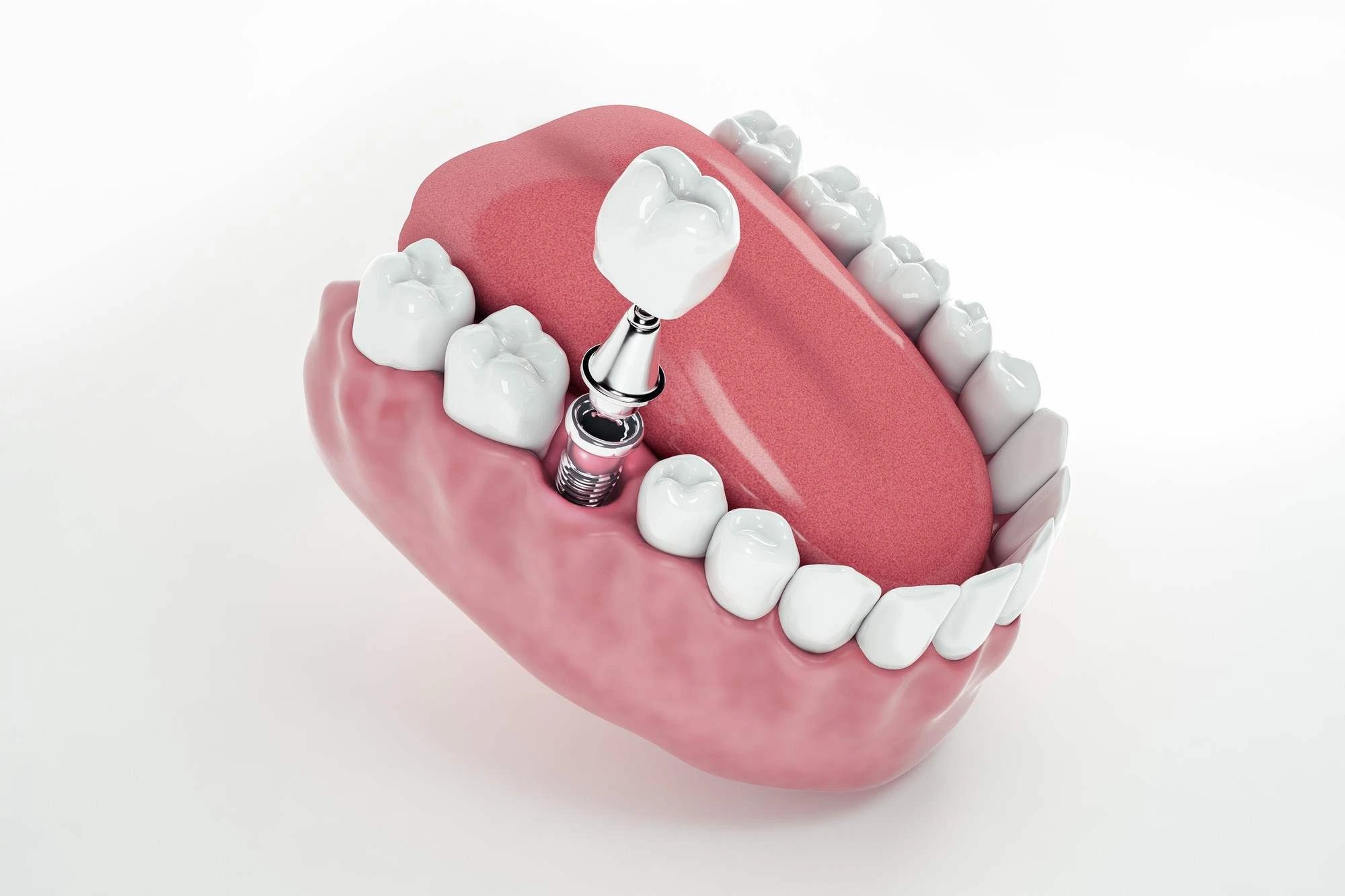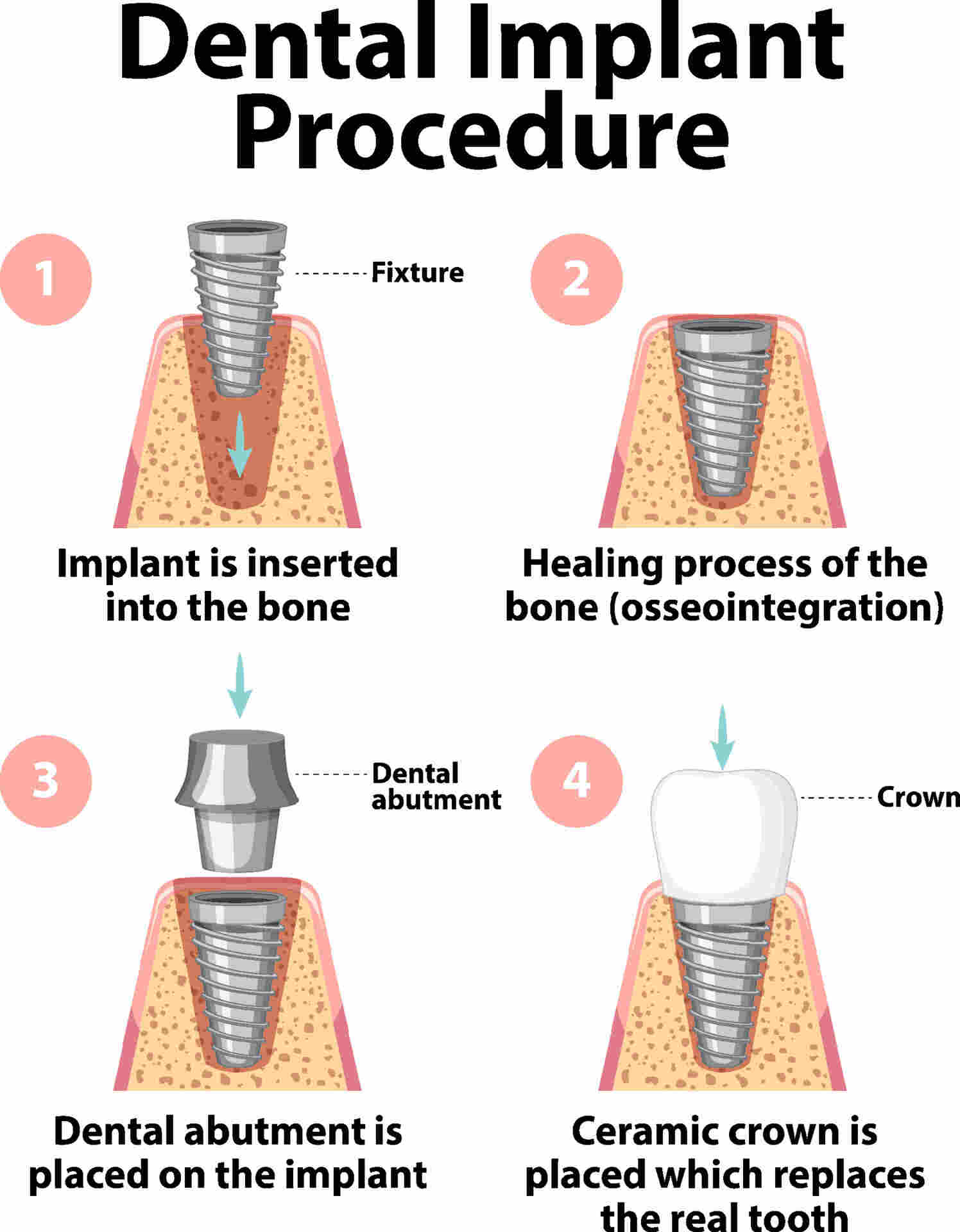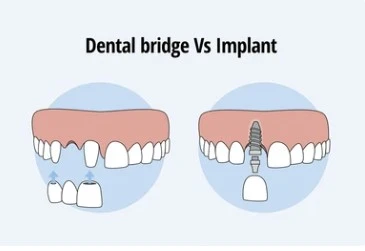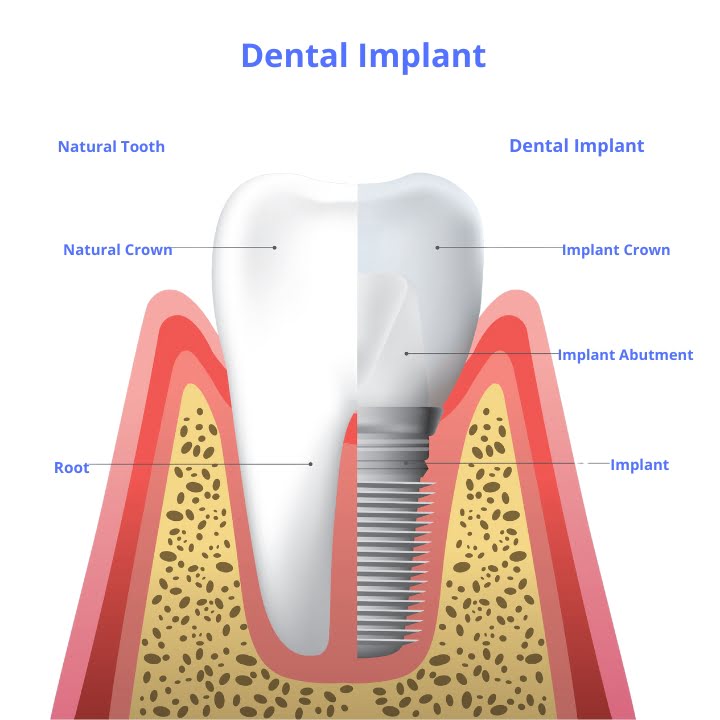What is dental implant surgery in Turkey?
Dental implant surgery is a procedure used to replace missing teeth with artificial teeth called screw-on teeth that look and function like natural teeth. They are usually made of titanium and integrate with the jawbone, providing a permanent solution.
Dental implant surgery in Turkey begins with a thorough evaluation to determine if the jawbone is suitable for implants. If necessary, you may need other procedures such as bone grafting to make the foundation good enough. In implant surgery, dental implants are placed in the jawbone using local anesthesia for the patient. This post replaces the lost tooth and becomes the new root for it. Once the tooth has healed into its proper position, a step called an abutment is placed, followed by a specific individual crown to provide a functional tooth that resembles the original.
The tooth implant procedure is performed by an experienced dentist. If you follow proper care, the results of dental implants are permanent. Implants offer an effective solution to problems such as chewing difficulties, aesthetic concerns, and osteoporosis caused by missing teeth.
Dental implants types
Dental implants are available in a few forms and the most appropriate form is determined by your dental situation and bone density.
Endosteal implants

Endosteal implants are the most common of all dental implant types. They are screwed directly into the jawbone and are usually made of titanium.
The advantages of endosteal implants are that they provide the most natural feel and appearance to the teeth. They have a high success rate. However, recovery after the procedure takes some time. In patients with bone loss, a bone graft may be required first.
Subperiosteal implants
A subperiosteal implant is placed above the bone and below the gum line when a person has insufficient jaw bone. A subperiosteal implant usually consists of a metal frame. The metal posts of the frame protrude from the gum and hold the prosthetic tooth.
The advantage of a subperiosteal implant is that it eliminates the need for adequate bone grafting. It can be a less invasive option. The disadvantages are that it is an older technique and is not as widely used as modern endosteal implants. The success rate may also be lower.
Zygomatic implants
Zygomatic implants are screwed into the cheekbones instead of the upper jaw, especially when there is no sinus or when it is too small to accommodate the implant. These implants are especially preferred in patients with severe bone loss. They are usually used for All-on-4 and similar full jaw prosthesis applications.
The advantages of zygoma implants are that they eliminate the need for bone grafts. They allow implants to be placed despite excessive bone loss.
The disadvantages are that the implant process can be more complicated and must be performed by specialist and highly experienced surgeons.
There is also a small-sized dental implant called mini dental implants, which are mostly used to support dentures. Finally, the all-on-4 implant option allows a series of teeth to be fixed using only 4 implants and is ideal for full-mouth rehabilitation.
Candidates for dental implants
| Condition | Requirement |
|---|---|
| Missing teeth | One or more teeth missing |
| Damaged teeth | Cannot be saved with crowns |
| Denture challenges | Issues with removable dentures |
| Gum health | Strong and healthy gums |
| Bone density | Sufficient jawbone for support |
| Age | Over 18 years old |
| General Health | No severe conditions like uncontrolled diabetes or hypertension |
Dental implants are ideal for any person who has lost one or more teeth and would like to have a natural tooth lookalike in their mouth for a permanent solution. Dental implant candidates are people who have loose dentures or damaged teeth that cannot be treated through normal crown or filling procedures.
For you to qualify for the implants, you should have healthy gums and sufficient bone in the jaw for implantation. As with any surgery, good overall health is desirable because certain health risks such as diabetes that is poorly controlled or severe heart disease may slow the healing process. You should be over 18 years old for optimal performance and physical maturation of the jawbone.
Benefits of dental implants in Turkey
A single dental implant has many benefits;
- Teeth implants do not only replace your smile but also the confidence to speak fluently and eat without fear of damaging your teeth.
- They are anchored into your jaw, therefore you will not experience the irritation or inconvenience of dentures shifting.
- Besides, they are long-lasting. Some last for years, perhaps a lifetime if well taken care of. No more cavities to worry about anyway because dental implants do not rot like natural teeth!
- They are truly natural-looking and they provide a durable and comfortable solution for any implant candidate who wants to enhance the quality of his or her life.
- Dental implants are easy to clean like your natural teeth, you don't have the same difficulties as cleaning dentures and bridges.
- From a single missing tooth to complete dentures, dental implants can be your go-to, long-lasting beautiful smile solution.
Understanding the steps involved can make dental implant surgery preparation a bit intimidating, but if you follow a few easy methods, you'll end up doing great;
- First, have an upfront dialogue with your dentist about any health conditions or drugs you're on—including supplements like vitamin E, blood thinner, or herbal teas that can play a role in healing.
- If you are a smoker, quit it or give a break because it slows down your recovery progress. Ensure to fulfill any prescriptions for painkillers or others before the date of surgery so you’re not in a rush on that day.
- On the day prior, avoid large dinners or coffee outings, since an empty stomach is best before your appointment.
- On the surgery day, don't wear tight or uncomfortable outfits, and keep jewelry and others at home.
- You should also have someone on hand to drive you to.
- In the days prior, drink plenty of water, skip the alcohol, and keep your intake of caffeine low. All of this ensures that you are preparing for an easy surgery and an uncomplicated recovery!
Some important dental implant steps performed at WinkSmile are shown below:

Step 1: Consultation and Planning
The initial process is consultation. The dentist will examine your oral condition, and take normal X-rays and 3D images to determine if the jawbone will support an implant. If not, then they recommend a bone graft. This planning stage is very important because it means that the implant will work as planned.
Step 2: Surgical Tooth Extraction
Some patients need bone grafting, especially those who have developed periodontal diseases. The damaged tooth has to be extracted. In a case where an individual has a poor-quality jawbone, surgery is performed to provide enough support to hold the implant. A graft involves the use of your own bone or a specially processed bone to reconstruct the jaw. This can take several months to recover but it is important for building solid ground.
Step 3: Implant Placement
An actual implant, which is a small titanium post, is inserted into the jawbone where the tooth is missing. This is done under local anesthesia, so you won’t feel the pain—only pressure on the skin. Then follows a period of stabilization, commonly referred to as osseointegration, during which the bone fuses with the implant. This may take two to three months, but it’s the foundation of a long-term implant.
Step 4: Healing Phase and Temporary Crown
If the implant is strongly bonded to the jawbone, a temporary crown is put on top of the implant. It also helps to determine the outline of the gums as they form in healing, to give you that near-natural dentillian appearance around your final crown.
Step 5: Abutment Placement
After the implant has integrated into the bone, a small piece of metal that connects to the implant, called the abutment, is screwed into the implant. This will hold the new tooth. Occasionally, this step is done simultaneously with the implant placement, but generally, it is done in another minor operation. The gum tissue around the abutment will take approximately two weeks to heal.
Step 6: Custom-Made Crown Placement
Once the gums become healthy again, impressions of the teeth are made so that a crown that matches in color, size, and shape to that of your teeth can be created. It is then placed on the abutment. After this, you have a brand-new, functional, and natural tooth that looks like the rest of your teeth.
No, dental implant surgery in Antalya is not as painful as it seems. Most patients are surprised at how painless the process is. Your dentist will give you local anesthesia to minimize the sensation during the surgery. This means that you will not feel any pain during the surgery.
At our Antalya dental clinic, you may feel a slight discomfort or pain similar to a toothache after having a tooth extracted for a few days after the anesthesia wears off. This discomfort will be reduced with regular painkillers such as ibuprofen, and our dentist may prescribe some painkillers if necessary. Pain, swelling, redness and bruising are normal and should subside within the next 72 hours.
The good news is that most claim that they only had to take pain medicines for a short time after surgery and were amazed at the lack of pain. You should adhere to your dentist’s postoperative instructions, such as applying ice packs to the cheek area to control swelling and avoiding difficult-to-chew foods.
One should also note that the kind of implant procedure that is to be undertaken and the personal tolerance level of an individual towards pain will also determine the overall experience. In all, it is way less uncomfortable than most people anticipate, and the advantages of having a fixed, real tooth make it all worthwhile!
| Region | Cost range | Description |
|---|---|---|
| Dental implant Turkey cost | $500 to $1000 | Affordable teeth implant cost is preferred by many countries. There is no waiting list in Turkey. VIP services are available from the airport to the hotel. Turkish dentists are experienced and well-educated. You can make your medical tourism and surgery at the same period. |
| Dental implant UK cost | $2000 to $4000 | Markedly higher teeth implant price. Patients also wait a long time for procedures. |
| Teeth implants cost Europe | $1500 to $3500 | Offers good value, with dental implant prices varying significantly depending on the country and clinic. |
Contact Dt. Müşerref Sert for detailed info about dental implant surgery and current dental implant costs.
Dental bridges

Dental bridges are a temporary solution to implants – they use two adjacent teeth as support pillars.
- The advantages of bridges are that they are faster, usually done in two visits, and are cheaper. They are done in less time.
- But what about the disadvantages? You have to cut down healthy teeth, which may not be the best thing to do.
Dental implant
A dental implant, on the other hand, is a permanent solution to the problem of missing teeth. It is like replacing a missing tooth with a new tooth, where the new tooth is fixed in the jaw with a titanium screw.
- It does not encroach on the adjacent teeth and feels like any standard tooth would.
- However, it is relatively slow, can take several months to complete, and is expensive, as will be shown below.
Implants are a long-term solution that will give you the best results. It is recommended that everyone consults their dentist depending on their case and see what works best for you.
| Yes, dental implant treatment in Antalya, Turkey is safe for the following reasons: |
|---|
| Experienced dentists |
| Cutting-edge dental clinics |
| Positive patient feedback |
| Strict controls of facilities |
Turkish dentists are very professional and proficient, particularly in the field of dental implants. They mention that they update their knowledge regularly by attending different intercontinental conferences which lets them be aware of new dental achievements.
Healthcare in Turkey is also controlled by the Ministry of Health and all clinics are equipped with modern equipment and technologies. The tools applied during the operations are also modern, so dental implant surgeries are safe and produce good results. The majority of patients are satisfied with the outcome, and the testimonials and comparison pictures are sufficient to convey the effectiveness. In my opinion, Turkey is most certainly an ideal place for the search for quality dental services!
Implants and dentures are known treatments for replacing missing teeth. Before you undergo any treatment, you may need to discuss your options with your dentist. Whether it is dental implants or dentures, it is important to consider what is best for your lifestyle and what you need for your teeth. Here are some of the main differences between implants and dentures;
Implants
Implant treatment usually involves two surgical procedures performed in the clinic under local anesthesia. First, your screw-in implant is placed in the jawbone. Once the bone has fused with the jaw, the crown can be placed on top.
- Implants are strong, look and feel like natural teeth.
- They do not require extra care compared to traditional dentures, and are easy to clean.
- Dental implants can last as long as your natural teeth with proper oral and dental health. However, healthy jawbone is needed.
- They are more expensive than dentures.
- Treatment times may be longer if you need any additional treatment.
- You can apply the same daily oral and dental health routine to implants as you would to your natural teeth.
Dentures
Dentures are artificial false teeth that are fixed to plastic or metal frames that are used to replace missing or damaged teeth. Dentures can be made in different types, such as removable or fixed. There are also types such as implant-supported dentures, where the dentures are attached to dental implants.
- Dentures are cheaper and suitable for candidates who may not be suitable for implants.
- They are fixed and can be a little challenging at first when it comes to eating and speaking, but they are effective.
- Getting dentures is generally a quicker process than implants because they are less complicated.
- Dentures usually need to be replaced every five to seven years on average. This is because the bone structure in the jaw and face can change, which can cause the dentures to move and loosen.
- Dentures require some adjustments because the patient's mouth changes over time and those who wear dentures need to replace them every few years. If you take care of your dentures, you will not experience any pain or problems.
In other words, if one is willing to have a long-term solution that does not feel artificial and is willing to spend, then implants are the best. If you are in search of something cheaper and less intrusive, then partial or full dentures would work for you.
Yes, it is worth spending your money on getting dental implants done.
On balance, dental implants are most certainly worthwhile for several reasons. Apart from aesthetics, they replace your teeth and also support the bone structure of the jaw by discouraging the occurrence of bone loss. Something that conventional dentures or bridges are unable to accomplish is this. Moreover, implants are more natural than any other teeth, because they make eating and speaking more comfortable. In addition to the health effects, they also increase self-confidence and self-esteem to help you live a full life and not worry about your teeth. They’re worth the time and energy because, in the long run, they are investments in your health and happiness!
Dental implants in Antalya can take anywhere from 4 months to 1 year to complete. In the simplest surgery, the implant placement process, including the placement of a cap, can take less than an hour if your jawbone is suitable for same-day dental implants. However, if you have been missing this tooth for a while and a dentist recommends a bone graft to the area today, it will take a few months longer.
After the implant has been placed it takes about 4 to 6 months before the patient has fully healed. This is when the implant slots into the jawbone and holds tightly. This process is very important for the implant’s stability. After that, you will return to get the crown set, and that is it, no more.
Consequently, the whole process can take not less than 4 months but can reach one year based on one’s requirements. It may seem like a long time but it is well worth it in the long run for a strong and permanent fix!
Choosing between a crown and an implant depends on the condition of your tooth and what you need for the best long-term result. In some cases where your tooth is cracked or decayed but the root is healthy, you may consider getting a crown. It functions like a lid. It covers and reinforces the remaining structures of the teeth and also gives the tooth its natural shape and functionality.
On the other hand, if the tooth cannot be restored or if it has to be extracted, perhaps an implant may be preferable. An implant entails the use of a metallic device, usually made of titanium to anchor the jawbone as a replacement for the tooth root. In the long run, its interface becomes inseparable from the bone, then for a crown that simulates the aesthetic characteristics of a natural tooth, which has identical shade and semi-transparency, it provides ideal support. This solution is also very durable as well and it prevents bone loss which can occur when one has a gap in their teeth.
In short, if the existing tooth can be preserved, a crown is sufficient. However, in case you need a replacement, then an implant offers a more permanent solution to that problem. An ideal procedure that should be taken relies on the exact nature of the problem and the condition of the teeth.
Yes, speaking may be a problem with dental implants. But it is not permanent. This usually occurs immediately after surgery. This happens because your tongue and mouth will take some time to get adjusted to the new structure. You might find it difficult to pronounce a particular word or sound at the initial stages and that is quite natural and does not last for a long time.
Like any other change that occurs in your mouth such as getting braces or a filling, it takes a while before everything becomes comfortable again. Some tips on how to handle this are to have a little patience and work towards getting used to the implants in your mouth so that your speech is back to normal. In case you struggle at the start, then encourage yourself to speak slowly and clearly with your mouth focusing for some time. Soon you will be speaking confidently again!
Note:
You can contact Dt Semra Özen to get detailed information about dental implants and to be examined. You can also read all on 6.
This article is for informational and advisory purposes. The recommendations of your surgeon should be a priority.
We wish you a healthy days.
Dental Implants vs Bridges for a Missing ToothHow Long Does It Take To Do Dental Implants?


